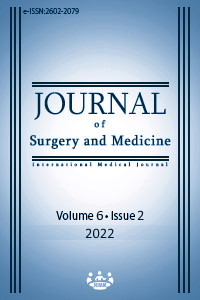Evaluation of stress and cognitive skills in individuals with tinnitus complaints
Keywords:
Tinnitus, Cognition, StressAbstract
Background/Aim: The sense of sound in the absence of external acoustic stimuli is known as subjective tinnitus, or phantom tinnitus. The purpose of this study was whether tinnitus complaints have an impact on perceived stress and cognitive skills like attention and memory. Methods: This prospective case-control study comprised 60 healthy volunteers between the ages of 18 and 25, all of whom had normal hearing. Using the G*Power program, it was established that a minimum of 50 people should be worked with an 80 percent power and a 5% margin of error. The study group consisted of 30 people with tinnitus complaints in their daily lives, whereas the control group consisted of the remaining people. Tinnitus Handicap Inventory and Perceived Stress Scale were applied to the participants within the scope of the working hypotheses. In terms of cognitive skills, the Stroop Test Form was applied to evaluate selective attention, focused attention and disruptive effects, and the Visual Auditory Digit Sequence Test Form was applied to evaluate short-term memory and working memory skills. The findings were analyzed with the SPSS program. Type 1 error level is determined as 5%. Results: According to Tinnitus Handicap Inventory, tinnitus complaint of all individuals in the study group is very mild. The statistically significant differences were found between the perceived stress level, Stroop and Visual Auditory Digit Sequence Test scores between people with and without tinnitus complaints. The poorer performance was observed in the group with tinnitus complaint. (P=0.037, P=0.017, P=0.010). No statistically significant relationship was found between perceived stress level, tinnitus and cognitive skills (P=0.067, P=0.160, P=0.208). Conclusion: Tinnitus is becoming a more common cause of health problems, sometimes coupled by psychological stress, and it affects cognitive skills. The study adds to the knowledge regarding the use of cognitive tests as a supplemental measurement in the evaluation of tinnitus and the impact of tinnitus on daily cognitive abilities.
Downloads
References
Haider HF, Bojić T, Ribeiro SF, Paço J, Hall DA, Szczepek AJ. Pathophysiology of subjective tinnitus: triggers and maintenance. Front Neurosci. 2018;12:866.
McCormack A, Edmondson-Jones M, Somerset S, Hall D. A systematic review of the reporting of tinnitus prevalence and severity. Hear Res. 2016;337:70-9.
Jastreboff PJ. Phantom auditory perception (tinnitus): mechanisms of generation and perception. Neurosci Res. 1990;8(4):221-54.
Langguth B, Landgrebe M, Kleinjung T, Sand GP, Hajak G. Tinnitus and depression. World J Biol Psychiatry. 2011;12(7):489-500.
Mazurek B, Szczepek A, Hebert S. Stress and tinnitus. HNO. 2015;63(4):258-65.
Newman CW, Jacobson GP, Spitzer JB. Development of the tinnitus handicap inventory. Arch Otolaryngol Head Neck Surg. 1996;122(2):143-8.
Andersson G. Psychological aspects of tinnitus and the application of cognitive–behavioral therapy. Clin Psychol Rev. 2002;22(7):977-90.
Erlandsson SI, Hallberg LR. Prediction of quality of life in patients with tinnitus. Br J Audiol. 2000;34(1):11-9.
Kennedy V, Wilson C, Stephens D. Quality of life and tinnitus. Audiological Med. 2004;2(1):29-40.
Pupić-Bakrač J, Pupić-Bakrač A. Comorbidity of Chronic Tinnitus and Psychological Stress-Which Came First, the Chicken or the Egg? Psychiatr Danub. 2020;32(suppl. 4):412-9.
Mohamad N, Hoare DJ, Hall DA. The consequences of tinnitus and tinnitus severity on cognition: a review of the behavioural evidence. Hear Res. 2016;332:199-209.
Tegg-Quinn S, Bennett RJ, Eikelboom RH, Baguley DM. The impact of tinnitus upon cognition in adults: A systematic review. Int J Audiol. 2016;55(10):533-40.
Brueggemann P, Neff PK, Meyer M, Riemer N, Rose M, Mazurek B. On the relationship between tinnitus distress, cognitive performance and aging. Prog Brain Res. 2021;262:263-85.
Mazurek B, Boecking B, Brueggemann P. Association between stress and tinnitus—new aspects. Otol Neurotol. 2019;40(4):e467-e73.
Neff P, Simões J, Psatha S, Nyamaa A, Boecking B, Rausch L, et al. The impact of tinnitus distress on cognition. Sci Rep. 2021;11(1):1-9.
Kaya C, Tansey TN, Melekoglu M, Cakiroglu O, Chan F. Psychometric evaluation of Turkish version of the Perceived Stress Scale with Turkish college students. J Ment Health. 2019;28(2):161-7.
Homack S, Riccio CA. A meta-analysis of the sensitivity and specificity of the Stroop Color and Word Test with children. Arch Clin Neuropsychol. 2004;19(6):725-43.
Koppitz EM. The visual aural digit span test for seventh graders: a normative study. J Learn Disabil. 1981;14(2):93-5.
Aksoy S, Firat Y, Alpar R. The Tinnitus Handicap Inventory: a study of validity and reliability. Int Tinnitus J. 2007;13(2):94-8.
Bamiou D-E, Campbell P, Liasis A, Page J, Sirimanna T, Boyd S, et al. Audiometric abnormalities in children with Gaucher disease type 3. Neuropediatrics. 2001;32(03):136-41.
ten Cate WJ, Curtis LM, Rarey KE. Immunochemical detection of glucocorticoid receptors within rat cochlear and vestibular tissues. Hear Res. 1992;60(2):199-204.
Horner K. The emotional ear in stress. Neurosci Biobehav Rev. 2003;27(5):437-46.
Mazurek B, Haupt H, Joachim R, Klapp BF, Stöver T, Szczepek AJ. Stress induces transient auditory hypersensitivity in rats. Hear Res. 2010;259(1-2):55-63.
Mazurek B, Haupt H, Klapp BF, Szczepek AJ, Olze H. Exposure of Wistar rats to 24-h psycho-social stress alters gene expression in the inferior colliculus. Neurosci Biobehav Rev. 2012;527(1):40-5.
Fagelson MA. The association between tinnitus and posttraumatic stress disorder. Am J Audiol. 2007; 16(2):107-17.
Elarbed A, Fackrell K, Baguley DM, Hoare DJ. Tinnitus and stress in adults: a scoping review. Int J Audiol. 2021;60(3):171-82.
Kraus KS, Canlon B. Neuronal connectivity and interactions between the auditory and limbic systems. Effects of noise and tinnitus. Hear Res. 2012;288(1-2):34-46.
Rossiter S, Stevens C, Walker G. Tinnitus and its effect on working memory and attention. J Speech Lang Hear Res. 2006;49(1):150-60.
Gabr TA, Abd El-Hay M, Badawy A. Electrophysiological and psychological studies in tinnitus Auris Nasus Larynx. 2011;38(6):678-83.
Downloads
- 535 551
Published
Issue
Section
How to Cite
License
Copyright (c) 2022 Nuriye Yıldırım Gökay, Bilgehan Tekin Dal
This work is licensed under a Creative Commons Attribution-NonCommercial-NoDerivatives 4.0 International License.
















